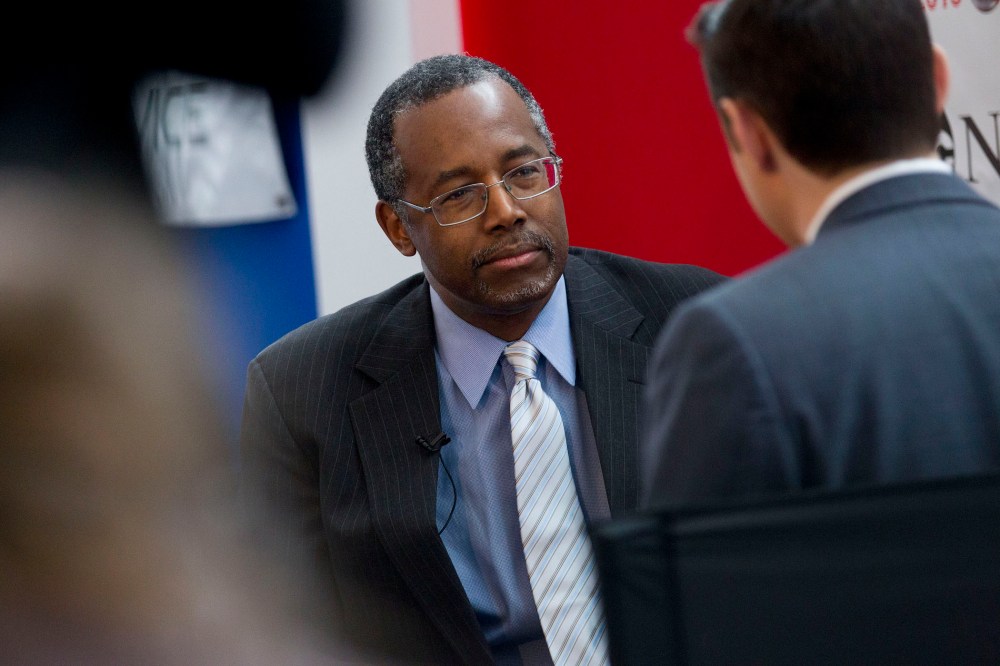Growing up in the predominantly black neighborhood of Forest Park in Baltimore, Erica Puentes considered Ben Carson her ultimate role model.
“We were fed a healthy diet of Ben Carson. Ben Carson is the figure you have to look up to, model yourself to be,” Puentes, a 20-year-old University of Maryland College Park student, recalls now. “We were working class students of color and he just represented hope.”
But now, as Republican presidential candidate and the only African-American in the crowded GOP field, Carson may be losing that legacy and disillusioning legions of fans who grew up idolizing him.
%22We%20were%20fed%20a%20healthy%20diet%20of%20Ben%20Carson.%22′
The renowned neurosurgeon – who overcame hardscrabble roots in inner-city Detroit to become the head of neurosurgery at Baltimore’s Johns Hopkins University and the first person ever to successfully separate twins conjoined at the brain – has been a folk hero, role model, and icon for many minority families. His memoir “Gifted Hands” was made into a TV movie, starring Cuba Gooding Jr. Last year, he tied for sixth in a Gallup poll as the most admired man in America.
Carson’s place in the nation’s cultural psyche was immortalized by “The Wire,” HBO’s acclaimed series set in Baltimore. When a teacher in one episode asks troubled kids their aspirations, most say they want to be drug kingpins. But one boy says, “I wanna be a pediatric neurosurgeon like that one n***er.”
But now, with his very conservative views and harsh criticisms of President Barack Obama, Carson has disillusioned many who once looked up to him.
Related: Carson campaign faces turmoil, staffing shake-up
“Everyone I’ve spoken to is just completely disappointed. The community definitely does not support him,” Puentes said. “He was a working class hero to us and now he’s advocating on behalf of a party that we believe and know advocates for the interests of more wealthy people.”
Carson’s party affiliation alone is a big problem, explained Leah Wright Rigueur, a professor of public policy at Harvard’s Kenney School of Government and author of “The Loneliness of the Black Republican.”
“African-Americans fundamentally believe that the Republican Party does not care about Black people and that’s a very hard legacy to overcome,” Rigueur told msnbc. “Historically, Black Republicans … do not fare as well amongst black audiences.”
When Carson went to meet with community leaders in Baltimore after riots broke out following the death of Freddie Gray in police custody, community leaders clashed with him over how to address the racial unrest plaguing the city where Carson had worked for three decades. Carson, according to those who attended the meeting, reiterated a message of self-reliance and turning the other cheek.
J. Wyndal Gordon, an attorney representing some who had been arrested in the protests, said he found Carson’s message simplistic.
“Oh how novel, work hard and go to school,” Gordon told msnbc. “We’ve been teaching ourselves and our kids that for decades and generations … Dig a little deeper.”
Gordon said that while Carson’s legacy in Baltimore is strong – “I’ve seen judges require defendants read his book [as part of sentencing],” he said – it’s fading now.
“He’s losing credibility with the Black community because he’s disconnected himself,” Gordon said. “The man has done great things in his time, it’s unfortunate that it takes a lifetime to build a reputation, but only a minute to lose it.”
‘Why do you wanna muck it up with politics?’
In 2002, then-Maryland state Republican Party Chairman Michael Steele – who went on to be the first black chairman of the Republican National Committee — sat down with Carson, who at the time was interested in getting involved in politics.
“Having an enormous amount of respect for him that I did at the time – and still do – and the incredible legacy that he’s created,” Steele told msnbc. “My question to him was why do you wanna muck it up with politics?”
Eleven years later, in 2013, Carson broke onto the national stage unexpectedly, when a speech he gave at the National Prayer Breakfast, criticizing President Obama who sat two seats away, went viral. A YouTube video of Carson’s lengthy, rambling address has received 3.7 million views to date.
Many on the right cheered on the Black conservative who’d taken on the president, but the Black community balked immediately.
“Ben Carson is this really big figure within American circles but especially within Black circles, but here he is willing to disparage the biggest name in Black circles,” Rigueur said. “People did not take kindly, whatever their politics are.”
Carson soon became a fixture on Fox News, spouting off controversial view after controversial view: Obamacare is the worst thing ‘since slavery,’ he said. He likened homosexuality to bestiality and pedophilia, when he said none of the three “get to change the definition of marriage.” Americans are “guilty” of human sacrifice in abortion, he said.
No matter what you did before, Steele said the presidential bid “becomes the first paragraph in your biography.”











